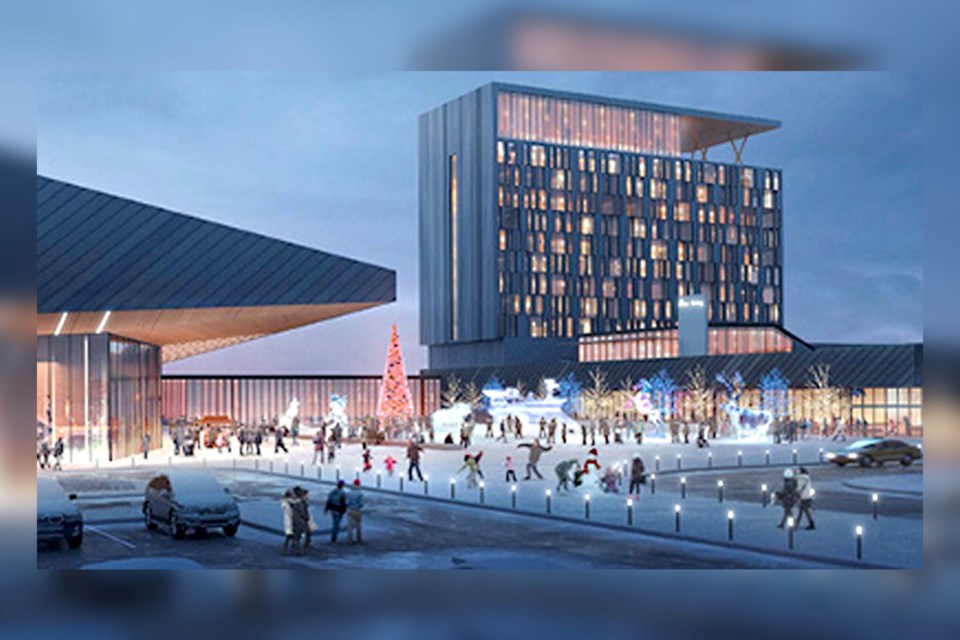With its cost more than doubling to $215 million, the future of the long-debated Kingsway Entertainment District has been cast into uncertainty.
Greater Sudbury city council is slated to debate the project’s ballooning costs during next Tuesday’s city council meeting, at which they’re expected to make a “go/no-go” decision.
According to a report by city engineering services director David Shelsted, the cost as it is currently estimated includes:
- $186.1 million toward the construction of a municipal arena/events centre building and associated exclusive siteworks, including parking and a shared space between the three facilities (which also include a private casino and private hotel) called Festival Square
- $3 million for the second phase of the design development
- $21.3 million toward the City of Greater Sudbury’s portion of shared site development costs
- $3.8 million of cost to date
- $400,000 toward HST
City council has already budgeted $100 million toward the municipal arena/events centre, which includes $90 million in already-secured debt and $10 million in fundraising. For the project to proceed, council would need to approve the expenditure of an additional $115 million.
In Shelsted’s report, which city council is posed to debate on Tuesday, the $115 million shortfall is recommended to be secured via debt over a 30-year term.
Factoring in the approximately $355 million in debt the city already has, they have a remaining borrowing capacity of $340 million under their self-imposed debt threshold.
With rising interest rates, it’s extremely unlikely the city will be able to obtain debt with the interest rate of 2.416 per cent they were able to secure for the existing KED-related debt load. The latest interest rate the city secured for other infrastructure projects earlier this year came in at 3.457 per cent, and Shelsted’s report anticipates an interest rate of five per cent.
The new debt’s annual servicing cost over the next 30 years is estimated at $7.48 million, of which $6 million would be on the tax levy and $1.48 million would come in via event centre revenue sources. Naming rights alone are projected to net more than $200,000 annually.
The original $100-million budget projected in 2017 used a general “cost per seat” approach to determine the cost of building the event centre, according to Shelsted’s report, which describes this approach as a “starting point” for the competitive design-build RFP process.
“Delays in the form of objections from individuals and community groups prevented that process from proceeding in a timely manner,” Shelsted’s report continues.
“These new estimates, prepared in the context of the pandemic, supply chain shortages and extraordinary inflationary pressures, are significantly higher than previous estimates but in line with industry trends.”
The city has predicted a 2022 inflation rate of 12 per cent, followed by five per cent in 2023 and four per cent in 2024.
At $215 million before factoring in interest, the project’s cost escalation is greater than even its most vocal opponents cautioned taxpayers it might reach, and follows this year’s revelation the Junction East library/art gallery had more than doubled in price.
City council approved moving forward with the $98.5-million Junction East project by pulling a $58-million debenture originally set aside for the now-suspended Junction West project, $1 million from reserves and $3.1 million from project partners. This left a gap of $37.2 million they are aspiring to get via external sources such as the federal and provincial governments.
According to Shelsted’s latest update, the city has spent $3.8 million on the KED to date.
Approximately $9.73 million in site preparation work was approved to commence by Nov. 29 of last year, but was cancelled when Gateway Casinos put their investment on pause within days of it commencing. Bot Engineering & Construction Ltd. was later awarded $1.1 million by the city for the inconvenience.
Although the KED’s final price tag might come as a shock to some, its original $92-million cost limit for the project’s design-build was called into question earlier this year when its three shortlisted proponents informed the city they were unable to proceed at that price.
In a media release issued by the city at the time, “current market risks, particularly with respect to inflation effects, supply chain reliability and labour availability” were cited as key concerns.
The city forged ahead with a progressive design-build process, which eliminated the cost ceiling.
Only two of the shortlisted proponents (Ball/TESC Construction Inc. and PCL Constructors Canada Inc.) ended up submitting a bid by the June 16 deadline. EllisDon Corporation dropped out, citing timing-related concerns in emailed correspondence with Sudbury.com.
As part of their bids, the proponents submitted non-binding construction budget estimates which informed the $215-million total budget estimate presented to city council for approval on Tuesday.
“Once there is an agreement between the city and the preferred proponent, the preferred proponent will work with the city to complete the detailed design and establish both a target price and firm schedule for the event centre,” according to Shelsted’s report.
“These deliverables will complete the second phase of the process, likely in late 2022. If the target price exceeds the approved budget, direction will be required from council.
Although the KED is now in a state of uncertainty, the Sudbury Wolves OHL team is here to stay and will make do with the existing 70-year-old Sudbury Community Arena, located in the city’s downtown core.
Team owner and KED developer Dario Zulich affirmed as much in conversation with Sudbury.com in April, when he clarified the team “will never leave Sudbury, categorically, and I will never sell that team.”
Tuesday’s city council meeting is scheduled to begin at 2 p.m. and can be attended in-person at Tom Davies Square or viewed virtually by clicking here.
Tyler Clarke covers city hall and political affairs for Sudbury.com.
